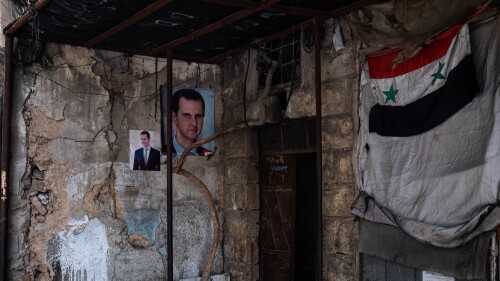A cold war is “the key to understanding the Middle East in the 21st century.” So argue Yigal Carmon and three of his colleagues at the Middle East Media and Research Institute (MEMRI) in a recent study, “An Escalating Regional Cold War.”
Iran’s President Mahmoud Ahmadinejad (left) with Saudi Arabia’s King Abdullah in Mecca in December 2005. |
They have identified a major confrontation that the media has somehow missed – and which is the more important for Mahmoud Ahmadinejad’s just having been re-designated as president of Iran. A cold war, according to the Merriam-Webster dictionary, is “a conflict over ideological differences carried on by methods short of sustained overt military action and usually without breaking off diplomatic relations.” Note the three elements in this definition: ideological differences, no actual fighting, and not breaking off diplomatic relations.
The classic instance of a cold war, of course, involved the United States and the Soviet Union between 1945 and 1991, a long lasting and global standoff. The “Arab cold war” of 1958-70, shorter and more localized, offers a second notable instance. In that case, Gamal Abdel Nasser, an Egyptian revolutionary, tried to upend the region while the Saudis led the effort to maintain the status quo. Their conflict culminated in the Yemen War of 1962-70, a vicious conflict that ended only with the death of Abdel Nasser.
A new ideological division now splits the region, what I call the Middle Eastern cold war. Its dynamics help explain an increasingly hostile confrontation between two blocs.
- The revolutionary bloc and its allies: Iran leads Syria, Qatar, Oman, and two organizations, Hezbollah and Hamas. Turkey serves as a very important auxiliary. Iraq sits in the wings. Paradoxically, several of these countries are themselves distinctly non-revolutionary.
- The status-quo bloc: Saudi Arabia (again) leads, with Egypt, Jordan, Lebanon, Tunisia, Algeria, Morocco, and most Arabic-speaking states following, along with Fatah. Israel serves as a semi-auxiliary. Note that Egypt, which once led its own bloc, now co-leads one with Saudi Arabia, reflecting Cairo’s diminished influence over the last half century.
- Some states, such as Libya, sit on the sidelines.
The present cold war goes back to 1979, when Ayatollah Khomeini seized power in Tehran and harbored grand ambitions to destabilize other states in the region to impose his brand of revolutionary Islam. Those ambitions waned after Khomeini’s death in 1989 but roared back to life with Ahmadinejad’s presidency in 2005 along with the building of weapons of mass destruction, widespread terrorism, engagement in Iraq, and the claim to Bahrain.
The Middle Eastern cold war has many significant manifestations; here are four of them.
(1) In 2006, when Hezbollah fought the Israel Defense Forces, several Arab states publicly condemned Hezbollah for its “unexpected, inappropriate and irresponsible acts.” An Iranian newspaper editorial responded with an “eternal curse on the muftis of the Saudi court and of the pharaoh of Egypt.”
(2) The Moroccan government in March 2009 announced that it had broken off diplomatic relations with Tehran on the grounds of “intolerable interference in the internal affairs of the kingdom,” meaning Iranian efforts to convert Sunnis to the Shiite version of Islam.
(3) The Egyptian government arrested 49 Hezbollah agents in April, accusing them of destabilizing Egypt; Hezbollah leader Hassan Nasrallah then confirmed that the group’s leader worked for him.
(4) Close Turkish-Israeli ties have floundered as Ankara’s increasingly overt Islamist leadership opposes Israeli government policies, deploys hostile language against the Jewish state, invites its enemies to Ankara, transfers Iranian arms to Hezbollah, and uses anti-Zionism to isolate the Turkish military.
By diverting passions away from the seemingly interminable Arab-Israeli conflict, the Middle Eastern cold war may appear to help reduce tensions. That, however, is not the case. However venomous relations between Fatah and Hamas may be, with each killing the other’s operatives, they will in the end always join forces against Israel. Likewise, Washington will not find significant support in Saudi Arabia or any other members of its bloc vis-à-vis Iran. In the end, Muslim states shy from joining with non-Muslims against fellow Muslims.
Looking more broadly, the Middle Eastern cold war internationalizes once-local issues – such as the religious affiliation of Moroccans – imbuing them with Middle-East wide repercussions. Thus does this cold war add new flashpoints and greater volatility to what was already the world’s most unstable region.
This article derives from a talk delivered earlier this month at an EMET-Heritage Foundation conference.
June 17, 2009 update:Where I refer to a “revolutionary bloc” above, I should have used the more accurate term, resistance bloc.
Nov. 9, 2009 update: For more on this conflict, see “The Middle Eastern Cold War: Updates.”








